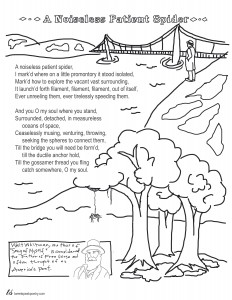What does a spider have in common with a soul? A lot, according to Walt Whitman.
“A Noiseless Patient Spider” was originally stanza three of a longer poem titled “Whispers of Heavenly Death.” It was excised and published as part of a later edition of Leaves of Grass, which continues to both delight and puzzle readers. Walt Whitman, the Father of Free Verse is one of America’s most acclaimed poets. He’s also one of our Take Your Poet to Work poets, which means he is very important. So important we also made this poem a coloring page.
Let’s take Will Willingham’s drawing and treat it like a one-page picture book. We have a man (presumably with a soul), standing and facing a bridge. We also have a spider (presumably noiseless and patient) hanging from a tree. The spider “stood isolated.” The soul stands “Surrounded, detached.” In the illustration, the man looks away from us, his hands in his pockets. The spider, its legs free and dangling, looks directly at us.
To me, all spiders that are not scary tarantulas or poisonous brown recluse are Charlotte. Charlotte is patient. Charlotte is sometimes noiseless, although she does enjoy talking with Wilbur.
A good story, like a good poem, needs no explanation. I would never attempt to explain E.B. White’s Charlotte’s Web — I’d just tell you to read it and let it tell you what it is about. So also with Walt Whitman’s poem. What is it about? It’s about itself.
It features a spider and a soul, and although I’d never thought how they might be alike, now I know they are. They both “explore” from their “measureless oceans of space,” and they both need to “catch somewhere.”
Charlotte describes that process in chapter 8, “Good Progress,” where describes weaving the web that will feature the word “Terrific.”
Charlotte got so interested in her work, she began to talk to herself, as though to cheer herself on. If you had been sitting quietly in the barn cellar that evening, you would have heard something like this:
‘Now for the R! Up we go! Attach! Descend! Pay out line! Whoa! Attach! Good! Up you go! Repeat! … Good girl!’”
It goes on like that for a whole paragraph, and the word “attach” occurs seven times. The soul is restless until it catches, as restless as a spider “tirelessly speeding” out gossamer threads. We need a “bridge,” an “anchor” (even a “ductile” one), a place to “catch somewhere.”
Charlotte’s webs did more than connect letters — they connected her to Wilbur, a connection that endured after she was gone, even after his connection with Fern unreeled in the natural process of growing up.
The job of a spider, like the job of a soul, is to only connect. Sometimes we are noisy and impatient. The world looks vacant and vast. We are “ceaselessly musing, venturing, throwing, / seeking.” But if the filaments we launch forth attach, that is miraculous.
Picture Uncle Walt beside the farmhand Lurvy in this scene, the next morning after Charlotte has finished her connection.
Next morning, Wilbur arose and stood beneath the web. He breathed the morning air into his lungs. Drops of dew, catching the sun, made the web stand out clearly. When Lurvy arrived with breakfast, there was the handsome pig, and over him, woven neatly in block letters, was the word TERRIFIC. Another miracle.”
Your Turn
Did you memorize “A Noiseless Patient Spider” this month? Join our By Heart community and share your audio or video using the hashtags #ByHeart and #MemoriesWithFriends and tagging us @tspoetry. We also welcome photos of your handwritten copy of the poem.
By Heart for December
For the next By Heart gathering, December 17, we’ll learn a short poem titled “Everything Is Going To Be All Right” by Derek Mahon. We’ll have three weeks to make these twelve lines our own. Our mental health might just depend on it.
Everything Is Going To Be All Right
How should I not be glad to contemplate
the clouds clearing beyond the dormer window
and a high tide reflected on the ceiling?
There will be dying, there will be dying,
but there’s no need to go into that.
The lines flow from the hand unbidden
and the hidden source is the watchful heart.
The sun rises in spite of everything
and the far cities are beautiful and bright.
I lie here in a riot of sunlight
watching the day break and the clouds flying.
Everything is going to be all right.
—Derek Mahon
Photo by Joel Olives, Creative Commons, via Flickr. Post by Megan Willome.
Browse more By Heart
“Megan Willome’s The Joy of Poetry is not a long book, but it took me longer to read than I expected, because I kept stopping to savor poems and passages, to make note of books mentioned, and to compare Willome’s journey into poetry to my own. The book is many things. An unpretentious, funny, and poignant memoir. A defense of poetry, a response to literature that has touched her life, and a manual on how to write poetry. It’s also the story of a daughter who loses her mother to cancer. The author links these things into a narrative much like that of a novel. I loved this book. As soon as I finished, I began reading it again.”
—David Lee Garrison, author of Playing Bach in the D. C. Metro
- Perspective: The Two, The Only: Calvin and Hobbes - December 16, 2022
- Children’s Book Club: A Very Haunted Christmas - December 9, 2022
- By Heart: ‘The night is darkening round me’ by Emily Brontë - December 2, 2022



Monica Sharman says
Megan, I followed the link on “only connect” and was intrigued. I’d never read Howards End. It’s about connecting?
Megan Willome says
Yes, here’s the whole quote: “Only connect! That was the whole of her sermon. Only connect the prose and the passion, and both will be exalted, and human love will be seen at its height. Live in fragments no longer.”
Monica Sharman says
Thank you! I put it on my Kindle.